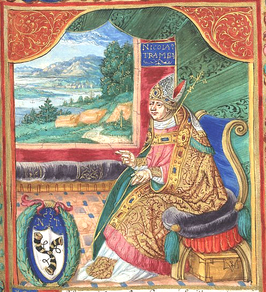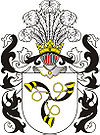- Mikołaj Trąba
-
Contents
Mikołaj Trąba, of Trąby Coat of Arms (1358 – 2 December 1422) was a Polish Roman Catholic priest, Royal Notary from 1390, Deputy Chancellor of the Crown 1403–12, bishop of Halicz 1410–12, archbishop of Gniezno from 1412, and first primate of Poland 1417–22.
Biography
Born in Sandomierz, he was the son of priest Jakub of Collegiate Chapter, and was adopted into the nobility (szlachta).
Confidant to Władysław Jagiełło
He was one of the advisors of king of Poland, Jogaila (Władysław II Jagiełło), becoming his confessor in 1386 and accompanying him during the baptism of Lithuania in 1387[1]. At court he held the titles of Royal Notary from 1390 and Deputy Chancellor of the Crown from 1403 to 1412. In 1391 with the help of queen Jadwiga of Poland he was allowed by Pope Boniface IX to undertake higher Holy Orders[2]. He was known for his opposition to the Teutonic Knights, and become trusted advisor of the king who often would discuss his plans only with him and his cousin Vytautas the Great[3].
Trąba accompanied the king into many battlefields, including the Battle of Grunwald in 1410 (Turnbull 2003)), where he was one of his chief clercs and officials. Because of Jagiełło's support, he became the bishop of Halicz from 1410 to 1412, and later an archbishop of Gniezno from 1412 onwards.
Council of Constance
As the leader of the Polish delegation to the Council of Constance (1414–1418) (along with Andrzej Łaskarz, Jakub z Korzkwi Kurdwanowski, Paweł Włodkowic and Zawisza Czarny), he was part of the larger German delegation (Kloczowski 2000, Żurek 2005). After they arrived in Konstanz in 1415, Trąba was, according to Ioannes Longinus, briefly considered as one of the candidates for papacy, although historians still debate the reliability of this information (Wyciślak 2004, Żurek 2005). Certainly Trąba temporarily abandoned his support for the Polish cause, supporting pro-Teutonic candidate Oddone Colonna, the future Pope Martin V against pro-Jagiełło Antipope John XXIII (Wyciślak 2004; Żurek 2005). This would later cause him problems in Poland, as well as his lack of criticism of the sentence on Jan Hus, which caused further questions about his loyalties in Poland and Bohemia, especially when contrasted with strong defence of Hus by Włodkowic (Wyciślak 2004).
He also strongly criticized the marriage of king Jagiełło to 45-year-old Elisabeth of Pilica and criticized his rival, the Archbishop of Lwów, Jan of Rzeszów, who remained in Poland (Wyciślak 2004). Some speculate that his stance was motivated by a desire to become pope, and that he hoped that after his election he would be able to reverse all the damage he had caused (Wyciślak 2004); others, that he put the elimination of the Western Schism over the good of his country [4]. In 1418 Pope Martin V was elected to that office, and quickly annulled Antipope John XXIII's papal bulls supporting Poland against the Teutonic Knights.
Mikołaj and other members of the Polish delegation felt betrayed and demanded reparations, at one point forcing an entry into a Papal audience. Eventually Martin condemned some of the more vocal and "anti-Polish" declarations of the Teutonic Knights, particularly that of Johannes Falkenberg. He offered Trąba the title of cardinal as a consolation, however Mikołaj refused, not willing to become a such close servant of the new Pope, accepting in exchange the honorary title of primate of Poland (Primas Regni); since then, all archbishops of Gniezno were also primates of Poland, which elevated them above the archbishops of Lwów (Wyciślak 2004). In Poland, the title of primate gained much importance, as the primate presided over local synods, crowned kings and even ruled if no king was present (as an interrex).(Kloczowski 2000)
Further controversy
Upon his return to Poland, Trąba was faced with many challenges, among them the accusation of treason, especially from the angry nobility (szlachta) eventually, he succeeded in clearing his name; ironically, he was defended by his rival, whom he had criticized at Konstanz, Archbishop Jan of Rzeszów(Wyciślak 2004).
Legacy
He ordered the creation of the manuscript Cronica conflictus Wladislai regis Poloniae cum cruciferis, Anno Christi 1410, and promulgated the Statutes of Trąba in 1420. The statutes became an important body of legal precepts lasting for many centuries (Kloczowski 2000).
While on a diplomatic mission to Sigismund, Holy Roman Emperor[5], he died on July 2, 1422, in Hungary; his body was brought back to Gniezno by the knight, Jan of Tuliszków. Trąba is buried in Gniezno Cathedral.
Preceded by
Mikołaj KurowskiPrimate of Poland
Archbishop of Gniezno
1418–1422Succeeded by
Wojciech JastrzębiecDeputy Chancellors of the Crown
(Podkanclerzy koronny)Jan z Buska • Janko z Czarnkowa • Klemens Moskarzewski • Zawisza Kurozwęcki • Stanisław Kurozwęcki • Mikołaj Trąba • Dunin ze Skrzyńska • Jan Szafraniec • Stanisław Ciołek • Władysław Oporowski • Wincenty Kot • Grzegorz Lubrański • Tomasz Strzępiński • Jan Lutek • Andrzej Oporowski • Wojciech Żychliński • Zbigniew Oleśnicki • Wincenty Przerębski • Maciej Drzewicki • Piotr Tomicki • Krzysztof Szydłowiecki • Samuel Maciejowski • Jan Ocieski • Jan Przerębski • Filip Padniewski • Franciszek Krasiński • Piotr Myszkowski • Stanisław Miński • Piotr Dunin-Wolski • Jan Zamoyski • Jan Borukowski • Jan Tarnowski • Wojciech Baranowski • Wawrzyniec Gembicki • Feliks Kryski • Henryk Firlej • Andrzej Lipski • Stanisław Łubieński • Jakub Zadzik • Tomasz Zamoyski • Piotr Gembicki • Jerzy Ossoliński • Andrzej Leszczyński • Wacław Leszczyński • Piotr Tylicki • Hieronim Radziejowski • Stefan Koryciński • Andrzej Trzebicki • Bogusław Leszczyński • Mikołaj Prażmowski • Jan Gniński • Jan Żniński • Andrzej Olszowski • Jan Leszczyński • Jan Stefan Wydżga • Jan Wielopolski • Jan Małachowski • Michał Stefan Radziejowski • Karol Tarło • Jan Szembek • Jan Kazimierz de Alten Bokum • Jan Lipski • Jan Małachowski • Andrzej Stanisław Młodziejowski • Michał Wodzicki • Maciej Garnysz • Jan Jędrzej Borch • Jacek Małachowski • Hugo Kołłątaj • Wojciech SkarszewskiReferences
- This article incorporates information from the revision as of 26 September 2006 of the equivalent article on the Polish Wikipedia.
- Jerzy Kloczowski, A History of Polish Christianity, Cambridge University Press, 2000, ISBN 0521364299, Google Print, p.65
- Stephen Turnbull, Tannenberg 1410, Osprey Publishing, 2003, 1841765619, Google Print, p.48
- (Polish) Jacek Żurek, BEP IPN DA UN PAESE LONTANO... POLSCY BISKUPI I KAPŁANI U ŚW. PIOTRA (999–1978)PDF (581 KB)
- (Polish) Pierwszy prymas - biography
- (Polish) Jan Lucjan Wyciślak, Pierwszy Prymas - article
Categories:- 1358 births
- 1422 deaths
- People from Sandomierz
- Polish bishops
- Archbishops of Gniezno
- Archbishops of Lwów
- 15th-century Roman Catholic archbishops
- People in the Battle of Grunwald
Wikimedia Foundation. 2010.


